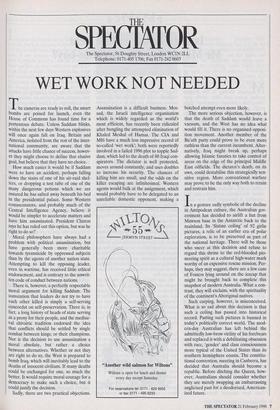SPECTATOR
The Spectator, 56 Doughty Street, London WC1N 2LL Telephone: 0171-405 1706; Fax 0171-242 0603
WET WORK NOT NEEDED
The cameras are ready to roll, the smart bombs are poised for launch, even the House of Commons has found time for a Portentous debate. Unless Saddam blinks, within the next few days Western explosives will once again fall on Iraq. Britain and America, isolated from the rest of the inter- national community, are aware that the attacks have little chance of success, howev- er they might choose to define that elusive goal, but believe that they have no choice.
How much easier it would be if Saddam were to have an accident, perhaps falling down the stairs of one of his air-raid shel- ters, or dropping a test tube of one of the many dangerous potions which we are assured he has salted away beneath his bed in the presidential palace. Some Western commentators, and probably much of the Central Intelligence Agency, believe it would be simpler to accelerate matters and have him assassinated. President Clinton says he has ruled out this option, but was he right to do so?
Moral philosophers have always had a problem with political assassination, but have generally been more charitable towards tyrannicide by oppressed subjects than by the agents of another nation state. Attempting to kill the opposing leader, even in wartime, has received little ethical endorsement, and is contrary to the unwrit- ten code of conduct between nations.
There is, however, a perfectly respectable moral argument for killing Saddam. The convention that leaders do not try to have each other killed is simply a self-serving concordat on self-preservation. There is, in fact, a long history of heads of state serving as a proxy for their people, and the mediae- val chivalric tradition endorsed the idea that conflicts should be settled by single combat between kings, or their champions. Nor is the decision to use assassination a moral absolute, but rather a choice between alternatives. Whether or not they are right to do so, the West is prepared to bomb Iraq, which will inevitably lead to the deaths of innocent civilians. If many deaths could be exchanged for one, so much the better. It would require moral courage for a democracy to make such a choice, but it could justify the decision.
Sadly, there are two practical objections. Assassination is a difficult business. Mos- sad, the Israeli intelligence organisation which is widely regarded as the world's most efficient, has recently been ridiculed after bungling the attempted elimination of Khaled Meshal of Hamas. The CIA and MI6 have a much less impressive record of so-called 'wet work'; both were reportedly involved in a failed 1996 plot to topple Sad- dam, which led to the death of 80 Iraqi con- spirators. The dictator is well protected, moves around constantly, and uses doubles to increase his security. The chances of killing him are small, and the odds on the killer escaping are infinitesimal. Western agents would balk at the assignment, which would probably have to be delegated to an unreliable domestic opponent, making a botched attempt even more likely.
The more serious objection, however, is that the death of Saddam would leave a vacuum, and the West has no idea what would fill it. There is no organised opposi- tion movement. Another member of the Ba'ath party could prove to be even more ruthless than the current incumbent. Alter- natively, Iraq might break up, perhaps allowing Islamic fanatics to take control of areas on the edge of the principal Middle East oilfields. The dictator's death, on its own, could destabilise this strategically sen- sitive region. More conventional warfare may prove to be the only way both to retain and restrain him.
In a gesture sadly symbolic of the decline in Antipodean culture, the Australian gov- ernment has decided to airlift a but from Mawson base in the Antarctic back to the mainland. Its 'Sistine ceiling' of 92 girlie pictures, a relic of an earlier era of polar exploration, is to be preserved as part of the national heritage. There will be those who sneer at this decision and refuse to regard this shrine to the red-blooded pio- neering spirit as a cultural high-water mark worthy of an expensive rescue mission. Per- haps, they may suggest, there are a few cans of Fosters lying around on the icecap that might be brought back to complete this snapshot of modern Australia. What a con- trast, they will exclaim, with the spirituality of the continent's Aboriginal natives.
Such carping, however, is misconceived. What is so sad about this decision is that such a ceiling has passed into historical record. Pasting such pictures is banned in today's politically correct world. The mod- ern-day Australian has left behind the admittedly low-brow virility of his forebears and replaced it with a debilitating obsession with race, 'gender' and class consciousness more typical of the United States than its southern hemisphere cousin. The constitu- tional convention, meeting in Canberra, has decided that Australia should become a republic. Before ditching the Queen, how- ever, Australians should consider whether they are merely swapping an embarrassing anglicised past for a deodorised, American- ised future.


























































 Previous page
Previous page